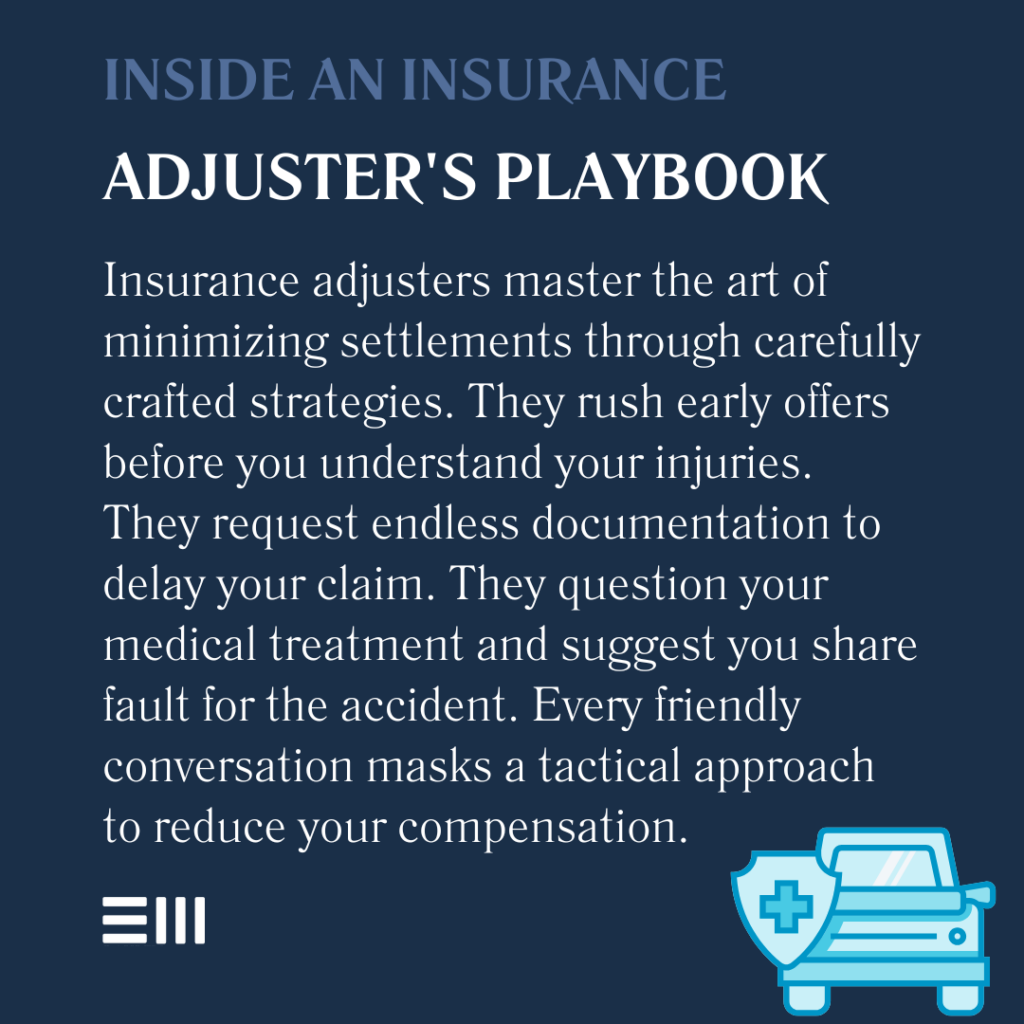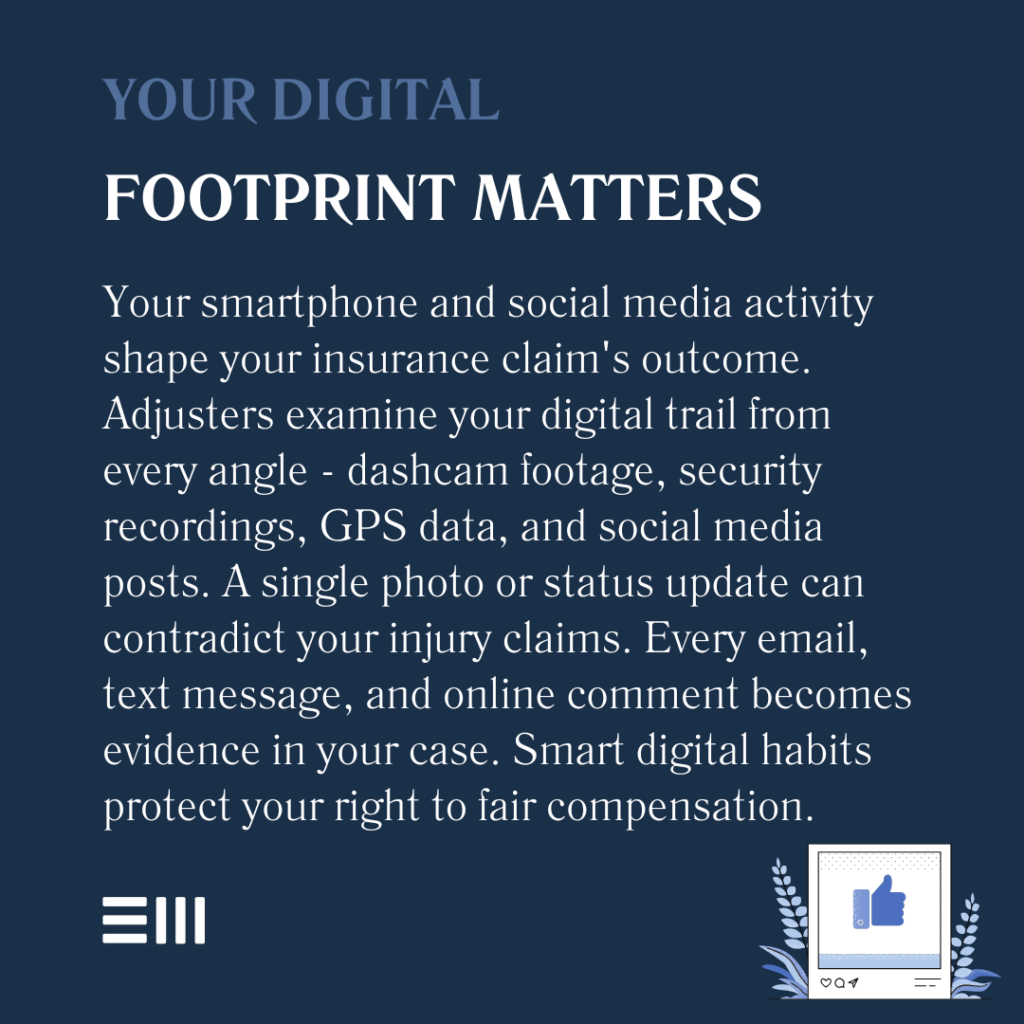
That friendly voice on the other end of the phone has rehearsed this conversation hundreds of times.
While you’re still processing the trauma of your accident, insurance adjusters are already calculating how to minimize your settlement.
Behind every casual question about your recovery lurks a strategy to protect their bottom line—not your future.
But knowledge changes everything.
When you understand how adjusters think and operate, that seemingly innocent conversation transforms into a pivotal moment that could affect your recovery for years to come.
The Role of Insurance Adjusters
Insurance adjusters serve as the gatekeepers between you and your compensation, wielding significant influence over your claim’s outcome.
They may present themselves as helpful advisors, but their primary duty lies with their employer: the insurance company.
How Adjusters Evaluate Your Claim
Before you speak with an adjuster, understand how they assess and value your case.
Several factors influence their decision-making process:
- Past settlements for similar injuries and accidents;
- Your medical treatment timeline and consistency;
- Documentation quality and completeness;
- Your recorded statements and social media activity;
- Local jury verdict histories; and
- Your willingness to negotiate.
These evaluation methods help adjusters calculate initial offers, though their first proposal rarely reflects your claim’s true value.

Common Adjuster Tactics and How to Respond
Insurance adjusters employ various strategies to minimize settlements.
Understanding these tactics helps you maintain control of your claim:
- Rushing early settlement offers before full injury assessment;
- Requesting unnecessary documentation to delay processing;
- Disputing medical treatment necessity;
- Suggesting fault despite clear evidence;
- Misrepresenting policy coverage terms; and
- Using recorded statements against claimants.
Recognizing these strategies allows you to respond effectively and protect your interests throughout negotiations.
Building Your Defense Against Minimization Attempts
Protect yourself from common adjustment tactics by establishing clear boundaries:
- Decline recorded statements without representation;
- Document all communication in writing;
- Request written confirmation of coverage details;
- Keep detailed medical treatment records;
- Maintain a communication log; and
- Verify all verbal promises in writing.
These protective measures create a strong foundation for your claim and limit opportunities for misinterpretation.
Navigating the Claims Process
The insurance claims process follows distinct stages, each requiring specific attention and documentation. A clear understanding of this progression helps you avoid common pitfalls.
Initial Steps After an Accident
Your actions immediately following an incident significantly impact your claim’s success:
- Document the accident scene thoroughly;
- Gather witness information;
- Seek immediate medical attention;
- Report the incident to your insurance company;
- Avoid discussing fault or making statements; and
- Begin organizing relevant documentation.
Taking these steps creates a solid foundation for your claim and demonstrates your commitment to proper procedure.
Documentation Requirements
Successful claims require comprehensive documentation.
Essential records include:
- Medical bills and treatment records;
- Lost wage verification;
- Property damage estimates;
- Accident scene photographs;
- Witness statements;
- Police reports; and
- Communication records with insurers.
Maintaining organized records strengthens your position during negotiations and speeds claim resolution.
Understanding Settlement Offers
Insurance companies calculate settlement offers using complex formulas that may not fully account for your specific circumstances. Several factors influence offer amounts:
- Medical expense totals;
- Lost income documentation;
- Future treatment needs;
- Pain and suffering impact;
- Property damage extent; and
- Liability clarity.
Careful evaluation of these elements helps determine whether an offer adequately compensates your losses.
Evaluating and Responding to Offers
Before accepting any settlement, consider:
- Future medical needs;
- Long-term disability impact;
- Career implications;
- Quality of life changes;
- Ongoing treatment costs; and
- Recovery timeline.
A thorough analysis ensures your settlement addresses both current and future needs related to your accident.
Frequently Asked Questions About Insurance Adjusters and Claims
Navigating insurance claims raises many questions about proper procedures and best practices.
Here are answers to common concerns.
How Long Should the Claims Process Take?
While simple claims might resolve in weeks, complex cases often require months for proper evaluation and settlement negotiation.
What if the Adjuster Pressures Me to Settle Quickly?
Quick settlement offers often undervalue claims. Take time to understand your injuries and damages before accepting any offer.
Should I Give a Recorded Statement?
Recorded statements can harm your claim. Politely decline and consult with legal counsel before providing any recorded testimony.
When Should I Accept a Settlement Offer?
Consider accepting only after reaching maximum medical improvement and fully understanding your long-term needs.
Can I Negotiate Medical Bills After Settlement?
Most settlements are final. Negotiate medical bills before accepting any settlement to ensure adequate compensation.
What Happens if Multiple Insurance Companies are Involved?
Claims involving multiple insurers require careful coordination and clear communication channels with each company’s adjusters.
How Do I Handle Disagreements About Fault?
Alabama’s contributory negligence law makes fault determination especially critical. Document all evidence supporting your position when disagreements arise.
Digital Communication and Your Claim
Modern claims processing increasingly relies on digital tools and communication methods. Understanding how to navigate these channels protects your interests while streamlining the process.
Managing Digital Evidence
Insurance companies now heavily weigh digital evidence in claims evaluation:
- Dashcam footage;
- Security camera recordings;
- Smartphone photos and videos;
- GPS data;
- Social media posts;
- Email communications; and
- Text message records.
Proper handling of digital evidence strengthens your position while preventing misinterpretation of electronic communications.
Social Media’s Impact on Claims
Your online presence can significantly affect your claim’s outcome. Insurance adjusters routinely monitor claimants’ social media for evidence that might contradict injury claims or suggest activities inconsistent with reported limitations.

Understanding Coverage Disputes
Coverage disputes arise when insurance companies question whether your policy applies to specific damages or circumstances.
These situations require careful analysis and often benefit from professional guidance.
Common Coverage Issues
Several situations frequently trigger coverage disputes:
- Pre-existing condition allegations;
- Policy exclusion interpretations;
- Coverage limit disagreements;
- Additional insured status questions;
- Notification timing disputes; and
- Policy language ambiguities.
Understanding these potential issues helps you prepare appropriate responses and documentation.
Handling Claim Denials
If your claim faces denial, you have several options:
- Request a detailed explanation in writing;
- Appeal the decision internally;
- Provide additional documentation;
- Seek independent medical evaluations;
- Consider legal representation; and
- File a complaint with state regulators.
Many initial denials can be overcome with proper documentation and persistent follow-up.
Get Professional Support for Your Claim
Don’t navigate the complex world of insurance claims alone. Our experienced team understands adjuster tactics and knows how to protect your interests.
Contact us today for a free consultation and learn how we can help secure the compensation you deserve.
Can't find what you're looking for? Search our site below.










